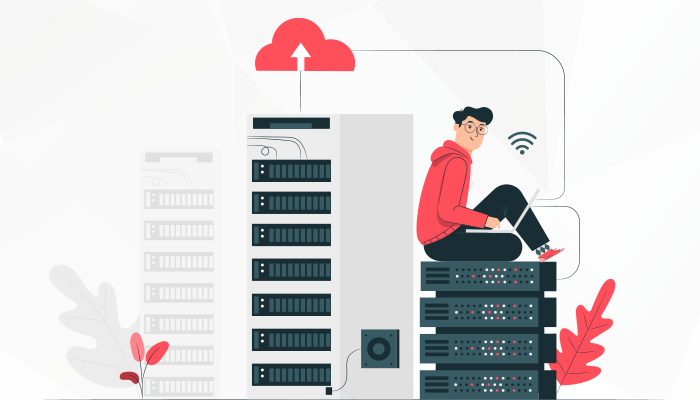Importance of a Web Server for Website Performance
Introduction
In modern times, we are floating on a sea of data and information from across the web. We also receive an endless number of notifications every day on your smart devices (unless, of course, you have turned them off!).
Multiple advertisers, merchants, websites, and people are trying to gain your attention every moment, leading to the harsh truth that we spend a lot of time on social media and eCommerce sites or apps.
In today’s fast-paced world, we hardly have enough time to spare. Therefore, from a business point of view, you need to ensure that your visitors are not having to wait for long before they get the information they are looking for.
To achieve that end, you need to work on improving your website’s page load time and performance so that the chances of sudden lags or breakdowns can be minimized.

What is Web Server?
It is a software application and underlying hardware that accepts user requests via HTTP and also from its secure variant, called HTTPS. It is designed to store the web server computer application and a website’s component files, including images, HTML documents, CSS stylesheets, and JavaScript files. The software in an HTTP server understands web addresses, commonly known as URLs and HTTP.
Moreover, a it helps to connect users to the Internet and also facilitates physical data interchange with additional web-connected devices. So, the three major elements of a web server include operating system software, underlying hardware (computers and other related devices and components), and software.
A web server is primarily responsible for displaying website content via storing, analyzing, processing, and delivering web pages to web users. Apart from HTTP, it also support other protocols like FTP (File Transfer Protocol), which is used for file transfers, email, and storage, and SMTP (Simple Mail Transfer Protocol).
Types of Server
Some of the common examples of web servers include Apache, Nginx (pronounced “engine X”), Microsoft IIS (Internet Information Services), and lighttpd (pronounced “lighty”). Among the above, the first two (Apache and Nginx) hold the maximum market share (one-third). Let’s discuss these common types of server in detail.
- Apache HTTP Server
Developed by the Apache Software Foundation, the Apache web server is the most commonly used and one of the best dedicated server hosting platforms in the world. You can install Apache on almost any operating system, such as Windows, Linux, macOS, Unix, FreeBSD, and more. In fact, nearly 60% of all web server platforms run on the Apache HTTP Server.
- Nginx
Nginx is an open-source server used for reverse proxying, load balancing, caching, media streaming, and of course, web serving. Initially, Nginx started as a web server for improving application performance and stability. But today, it can accelerate application and content delivery, facilitate availability, improve security, and boost scalability for even the busiest websites on the World Wide Web.
- Microsoft IIS (Internet Information Services)
Microsoft’s IIS is a high-performing server that runs on Windows 2003 and NT/2000 operating systems (and also maybe on all the upcoming Windows versions). Since Microsoft Internet Information Services is tightly integrated into the operating system, you can find its interface smoother and more efficient. Besides, Microsoft IIS is a secure, flexible, and scalable web server that can host anything on the web.
- lighttpd
lighttpd is another fast, secure, flexible, and compliant that the developers have optimized for boosting high-performance environments. Even though this free web server is distributed with the FreeBSD OS, it can still run on other operating systems like macOS, Windows, Linux, and Solaris. We can consider lighttpd the best dedicated server that consumes less CPU power and is specifically optimized and scaled for speed-critical environments.

Importance of Web Server:
It play the vital role of storing, processing, and providing their end users with relevant information or web pages as per their requests. So, if you are looking forward to creating and publishing your website, you will need full access to a flexible, secure, and compliant web server. It can also provide backup for all your vital web page content and files for quick restorations in emergencies, such as site crashes.
Website hosts are the most convenient and common way of doing this. Web hosting, again, is a service that delivers the required server space to your website for storing its vast chunks of data, files, databases, and assets. By storing site files and broadcasting them over the World Wide Web, web servers enable a website’s visitors to see your web content easily and quickly.
Conclusion
In a nutshell, web servers contribute to improving a website’s performance and speed. Having poorly performing websites is better than having no website at all! Besides, slow web portals also damage brand reputation and impact organic SEO rankings negatively. So, invest in a safe, flexible, and compliant web server to enhance the optimal performance of your website.
FAQ
Q. 1. Is HTML a web server?
HTML is a standard language (HyperText Markup Language) that is used to create web pages that are hosted on web servers. An HTML code for a website determines how the site will look like in terms of display, content distribution, placement of different elements, and overall aesthetics. So, the short answer is ‘No’. HTML is a language used to develop and write website codes and is not really a web server.
Q. 2. Is a web server the same as an IP address?
Every IP address has a unique IP address, just like you have for the device or computer system you are using. The IP address of a server is constant, and it doesn’t change, unlike that of your computer, which can change depending on the Internet you are connected to.
So, an IP address is not exactly a web server – it is just a unique identifier for the concerned server. A web server’s IP address is usually sent in your company’s welcome email, so check for the welcome email you received after registering with the server.
Q. 3. Where is the web server located?
Web servers are usually located and hosted in a data center in the form of racks. A data center acts as the cabinet or closet for storing multiple web servers. These closets help to isolate all sensitive equipment and computer systems from hackers or other people who are not allowed to access them.







